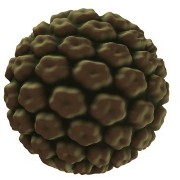 Photo: Getty Images
Photo: Getty Images
Lupus, short for systemic lupus erythematosis, is a medical condition related to the autoimmune system in which the body is seen as the enemy. The body then begins to attack itself, causing long term inflammation and damage which can involve the joints, liver, kidneys, brain and skin. One symptom which most people associate with lupus is a typical butterfly-like appearance -- malar rash -- on the face, usually extending on either side over the bridge of the nose.
Research was conducted to determine if this was a side effect of the lupus itself, or the therapy received by the patient to treat the disease. This was determined utilizing data from eight different disease centers which treat lupus in addition to the Danish Cancer.
In a study recently released from the University of Demark and involving a cohort study of 576 individuals, there was noted to be an increase in malignancies caused by the human papillomavirus in general. Because of its effects on the body’s immune system, an attempt was made to determine if this was so.
While there was found to be an increase in all HPV-related cancers, the one which stood out as having the highest incidence was that of HPV-induced anal cancer. While HPV stands out in the media as being responsible for cervical cancer, it has long been known to be the result of over 90 percent of anal cancers as well. It has also been shown that patients with lupus have a small increase related to overall cancer risk when it comes to non-Hodgkin’s lymphoma.
Burkitt’s lymphoma, which is a form of non-Hodgkin’s lymphoma, has also been shown to be the result of a virus, the EB (Ebstein-Barr) virus. Like HPV, zur Hausen eventually proved that EB DNA was present in every cell of Burkitt’s lymphoma and like HPV could be activated in certain cells to produce cancer. He also identified, during that same time, that oropharyngeal cancers were there the results of viruses. Hepatits B and C, also viruses, have long been known to be associated with liver cancer.
More current research by connected HPV to oropharyngeal cancers with current ratios of those attributable to HPV at 75 percent. This was confirmed with evidence presented to the ACIP (Advisory Committee for Immunization Practices).
Given the increasing connecting between viruses and so many various forms of cancer, one must postulate if perhaps in the future, we will find that all cancers are virus-related. Yet one reasons why, when we have the ability at this point in time to vaccinate against at least six of these, we have not as yet seen a wide-spread public health campaign to do so. Who knows how many of these same viral strains will be shown to cause other cancers in time.
Sources:
Walsh, Nancy, and MedPage Today. "Medical News: HPV-Related Anal Cancer Risk High in Lupus - in Rheumatology, Lupus from MedPage Today." Medical News and Free CME from MedPage Today. N.p., n.d. Web. 7 Oct. 2011. http://www.medpagetoday.com/Rheumatology/Lupus/28823
McIntyre, Peter Masterpiece, Finding the viral link: The Story of Harald zur Hausen. p. 3-4. Web. 7 Oct. 2011.
http://www.cancerworld.org/pdf/6737_cw7_32_37_Masterpiece%20(2).pdf
" HPV-Linked Oral Cancers on the Rise, Study Finds." CancerCompass - Empowering cancer patients to make informed decisions. N.p., n.d. Web. 7 Oct. 2011.
http://www.cancercompass.com/cancer-news/article/38278.htm?c=NL20111005
Reviewed October 10, 2011
by Michele Blacksberg RN
Edited by Jody Smith





Add a CommentComments
There are no comments yet. Be the first one and get the conversation started!